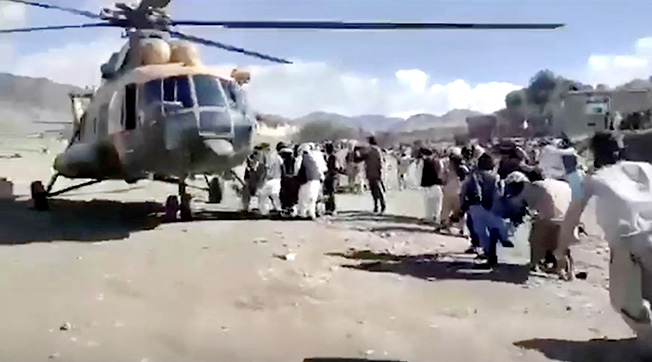The death toll from an earthquake in Afghanistan on Wednesday hit 1,000, disaster management officials said, with more than 600 injured and the toll expected to grow as information trickles in from remote mountain villages.
Houses were reduced to rubble and bodies swathed in blankets lay on the ground after the magnitude 6.1 earthquake, photographs on Afghan media showed.
An unknown number of people remained stuck under rubble and in outlying areas, photos showed. Health and aid workers said rescue operations were complicated by difficult conditions including rains, landslides and many villages being nestled in inaccessible hillside areas.
“Many people are still buried under the soil. The rescue teams of the Islamic Emirate have arrived and with the help of local people are trying to take out the dead and injured,” a health worker at one of Paktika’s main hospitals said, asking for anonymity as he was not authorised to speak to media.
Mounting a rescue operation will prove a major test for the hard-line Islamist Taliban authorities, who took over the country last August after two decades of war and have been cut off from much international assistance because of sanctions. The Taliban-led ministry of defence is leading rescue efforts.
The United Nations said it was deploying medical health teams and providing medical supplies but that it does not have search and rescue capabilities in Afghanistan.
Interior ministry official Salahuddin Ayubi said the death toll was likely to rise “as some of the villages are in remote areas in the mountains and it will take some time to collect details.”
DEADLIEST QUAKE IN 20 YEARS
Wednesday’s quake was the deadliest in Afghanistan since 2002. It struck about 44 km (27 miles) from the southeastern city of Khost, near the border with Pakistan, the U.S. Geological Survey (USGS) said.
Shaking was felt by about 119 million people in Pakistan, Afghanistan and India, the European-Mediterranean Seismological Centre (EMSC) said on Twitter, but there were no immediate reports of damage or casualties in Pakistan.
The EMSC put the earthquake’s magnitude at 6.1, though the USGC said it was 5.9.
Disaster experts and humanitarian workers said the impoverished hilly areas struck by the quake were especially vulnerable, with landslides and poorly built houses adding to widespread destruction.
“We were all sleeping at home… and the room fell over us,” said Gul Faraz as he received treatment for injuries with his wife and children at a hospital in the eastern province of Paktika. Some family members had been killed, he said.
“All the houses in our area were destroyed, not one, but the entire region has been destroyed.”
Most of the confirmed deaths were in Paktika, where 255 people were killed and more than 200 injured, Ayubi said. In the province of Khost, 25 were dead and 90 had been taken to hospital.
Haibatullah Akhundzada, the supreme leader of the ruling Taliban, offered his condolences in a statement.
Adding to the challenge for Afghan authorities is recent flooding in many regions, which has blocked stretches of highway.
Afghanistan is also grappling with a severe economic crisis. In response to the Taliban takeover last year, many countries imposed sanctions on Afghanistan’s banking sector and cut billions of dollars in development aid.
Humanitarian aid has continued, however, from international agencies such as the U.N.
A foreign ministry spokesman said the Taliban would welcome international help. Several countries, including neighbouring Pakistan and Iran said they were sending humanitarian aid including food and medicine.
U.N. Secretary-General Antonio Guterres said the United Nations was fully mobilized, assessing the needs and providing initial support.
“We count on the international community to help support the hundreds of families hit by this latest disaster. Now is the time for solidarity,” he said in a statement.
Large parts of South Asia are seismically active because a tectonic plate known as the Indian plate is pushing north into the Eurasian plate. Read full story







Click here to change your cookie preferences